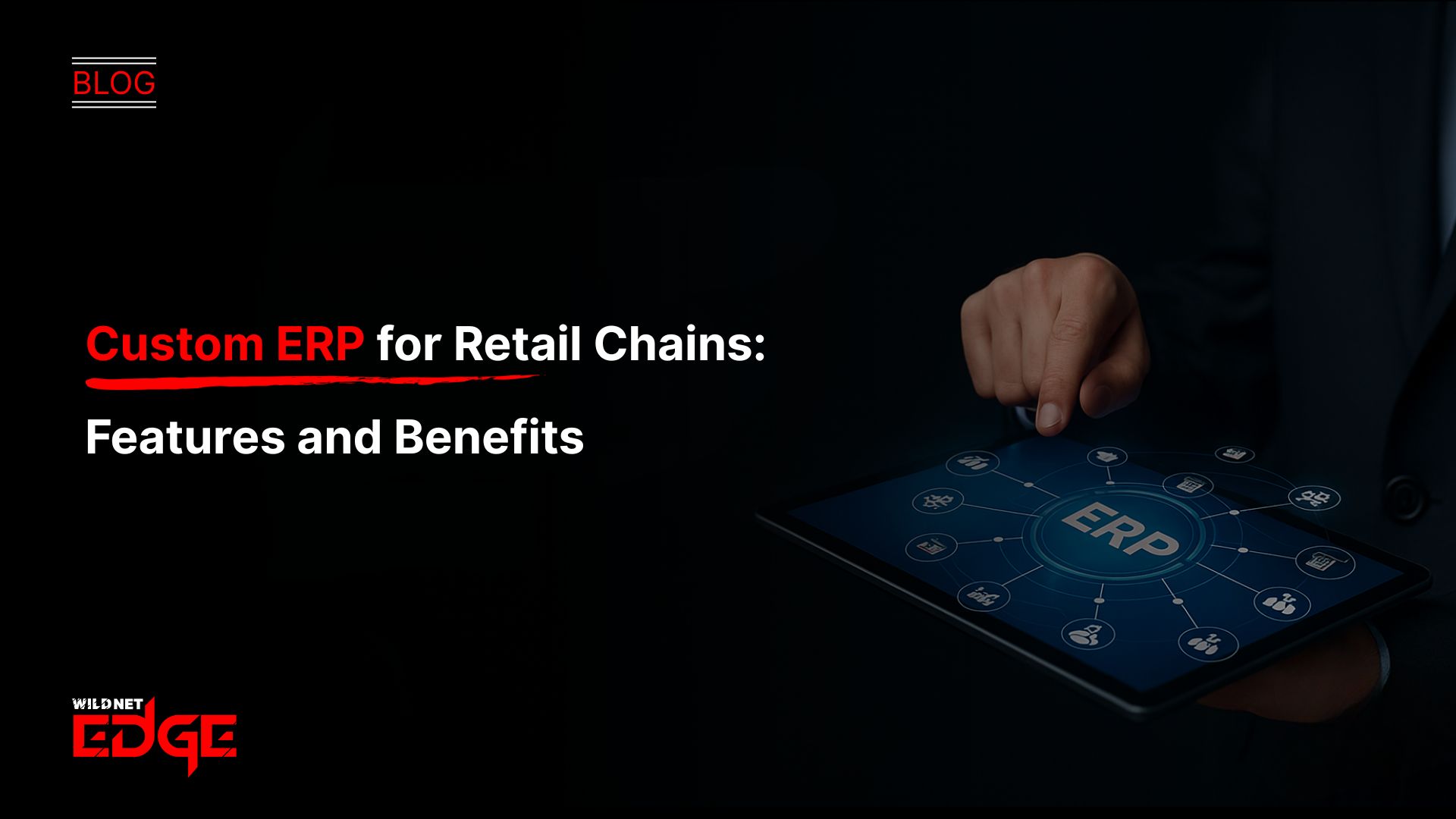Struggling to keep your retail chain’s operations smooth and profitable? Managing inventory discrepancies and predicting sales trends can feel like an uphill battle. What if there was a way to streamline all these complexities with one tailored solution? Custom ERP for retail is the game-changer your business needs—it’s designed to solve your biggest operational headaches while driving growth. In this post, we’ll explore how a custom ERP system can revolutionize your retail chain’s inventory control and sales forecasting, empowering you to stay ahead in a competitive market.
Inventory Control Optimization in Retail ERP
Inventory control is the backbone of any successful retail chain, and custom ERP systems excel at optimizing this critical function. Effective inventory management means not only knowing what you have in stock but ensuring it aligns perfectly with customer demand—reducing waste, avoiding stockouts, and maximizing sales potential.
Custom ERP for retail provides real-time stock monitoring, offering instant visibility into inventory levels across all store locations and warehouses. This eliminates the traditional lag between stock movement and reporting, enabling quicker decision-making and more responsive supply chain management.
An essential component of this optimization is automated reorder points and notifications. Using preset thresholds informed by historical sales data and supplier lead times, the ERP system triggers alerts or even automatically places replenishment orders. This automation slashes errors, reduces the risk of replenishing too late, and prevents inventory pile-up that ties up working capital unnecessarily.
Integration with POS and supply chain systems further enhances accuracy. For example, when a sale is processed through the POS, the ERP instantaneously updates stock counts, triggering alerts if inventory dips below recommended levels. Synchronization with supplier and logistics platforms also enables smoother procurement and shipping workflows.
The result? A significant reduction in stockouts that disappoint customers and lost sales, while simultaneously preventing costly overstock situations. Retail chains gain tighter control over inventory turnover, reduce carrying costs, and improve cash flow—all critical factors for sustainability and growth in 2026’s dynamic retail environment.
Actionable Tip:
Implement custom ERP dashboards that highlight fast-moving products and slow sellers weekly, allowing your procurement team to fine-tune orders proactively.
Advanced Sales Forecasting with Custom Retail ERP
Accurate sales forecasting is indispensable to retail chains’ operational success and profitability. Custom ERP solutions leverage advanced sales forecasting modules that combine historical sales data with cutting-edge analytics and machine learning techniques to generate reliable future sales projections.
By analyzing past sales trends, seasonality, promotions, and emerging customer behaviors, ERP systems can build dynamic forecasting models. Machine learning algorithms refine these predictions over time by tracking actual sales against forecasts, continuously improving accuracy.
For instance, retail chains can implement seasonal and trend-based forecasting adjustments automatically—preparing inventory and marketing strategies months ahead for critical periods like holiday seasons or back-to-school promotions. This prevents understocking during peak demand or excess inventory that bogs down margins.
These forecasts inform procurement by recommending optimal order quantities aligned with predicted demand—minimizing stock wastage and supplier rush fees. Marketing teams, on the other hand, can adjust campaign timings and budgets based on predicted consumer buying behavior, enhancing campaign ROI.
Real-world Example:
A multi-location apparel chain using custom ERP forecasting noticed a 15% reduction in end-of-season markdowns by aligning inventory orders with data-driven sales projections. As a result, clearance costs dropped, and profit margins improved significantly.
With retail market conditions becoming increasingly volatile, custom ERP solutions equip chains with the agility to anticipate demand changes and adapt swiftly—a critical competitive advantage in 2026.
Actionable Tip:
Use the ERP’s forecasting insights to implement rolling forecasts reviewed bi-weekly, allowing dynamic strategy adjustments to market trends without overhauling plans.
Key Features of Custom ERP for Retail Chains
Custom ERP solutions for retail chains come packed with features specifically designed to meet the multifaceted demands of multi-location retail management.
Centralized management of multiple store locations is a core offering. It consolidates inventory, sales, and employee data in one central system, providing a holistic view of operations and simplifying inter-store transfers or promotions.
Customer relationship management (CRM) integration enables deeper understanding of shopper behavior by linking purchase history, preferences, and loyalty programs. This integration empowers personalized marketing and improved customer satisfaction.
POS system synchronization is another critical feature. Real-time data exchange between the ERP and POS ensures sales data and inventory levels remain accurate and up-to-date across stores, supporting faster transaction processing and precise stock control.
Mobile and cloud accessibility provide retail managers and employees access to vital ERP functionalities on the go, enabling remote monitoring and quick decision-making. CIOs benefit from cloud deployment by reducing IT infrastructure costs and enhancing system scalability.
Scalability and customization options allow retailers to tailor ERP modules to unique business workflows and growth plans. Whether it’s adding new store locations, incorporating emerging payment methods, or customizing reporting dashboards, flexible ERP architectures enable seamless adaptation without disrupting daily operations.
Actionable Tip:
Choose an ERP provider offering modular add-ons so you can start with essential features and expand your system as your retail chain grows.
Emerging Trends and Advanced Tactics in Retail ERP
The future of retail ERP is being reshaped by emerging technologies and strategies designed to provide even sharper inventory control and sales forecasting capabilities.
AI-powered demand sensing and predictive analytics go beyond traditional forecasting by detecting subtle shifts in consumer behavior through real-time data streams, including social media trends and local market developments. This proactive approach helps retail chains anticipate demand spikes or drops earlier than ever.
IoT integration for smart inventory tracking incorporates connected devices like RFID tags and smart shelves to automate stock counting and quality control. Such precision minimizes human error and enables instant replenishment actions, particularly valuable in high-volume retail environments.
Omnichannel retail support is another trend shaping ERP solutions. Custom ERP systems now handle sales from physical stores, e-commerce platforms, mobile apps, and social media marketplaces in one unified system—ensuring inventory accuracy and consistent customer experience regardless of channel.
Enhanced security and compliance features have become paramount as retail chains handle increasing amounts of customer data. Advanced ERP systems in 2026 embed multi-factor authentication, encryption, and data privacy modules to comply with global standards like GDPR and CCPA, managing risks while building customer trust.
Forward-thinking retailers employing these tactics reap significant benefits such as improved operational agility, reduced costs, and elevated customer loyalty.
Actionable Tip:
Pilot AI-driven demand sensing features on a select group of SKUs before scaling across your inventory to measure accuracy gains and ROI.
Conclusion
Effective inventory control and accurate sales forecasting are no longer optional—they’re essential for retail chains aiming to thrive. Custom ERP for retail integrates these capabilities into one seamless platform, tailored to your business’s unique needs. When looking for a trusted partner to develop or implement your ERP, WildnetEdge stands out for its industry expertise and customer-centric approach. Take the next step in transforming your retail operations with WildnetEdge’s custom ERP solutions and position your chain for sustained growth in 2026 and beyond.
FAQs
Q1: What are the benefits of using custom ERP for retail chains?
Custom ERP solutions improve inventory control, enhance sales forecasting, streamline operations, and provide scalability tailored to retail-specific challenges.
Q2: How does an ERP system improve inventory control for retailers?
ERP systems provide real-time stock visibility, automate reorder alerts, integrate with POS, and reduce errors, preventing stockouts and excess inventory.
Q3: Can custom ERP solutions help with sales forecasting accuracy?
Yes, by leveraging historical sales data and advanced analytics, custom ERPs provide more reliable sales forecasts to inform procurement and marketing.
Q4: What features make a retail ERP system “custom”?
Custom ERPs offer tailored modules, multi-store management, CRM integration, mobile access, and the flexibility to adapt to unique business workflows.
Q5: Why choose WildnetEdge for implementing custom ERP in retail?
WildnetEdge has proven expertise in retail ERP, delivering scalable, secure, and fully customized solutions that align perfectly with your business goals.

Nitin Agarwal is a veteran in custom software development. He is fascinated by how software can turn ideas into real-world solutions. With extensive experience designing scalable and efficient systems, he focuses on creating software that delivers tangible results. Nitin enjoys exploring emerging technologies, taking on challenging projects, and mentoring teams to bring ideas to life. He believes that good software is not just about code; it’s about understanding problems and creating value for users. For him, great software combines thoughtful design, clever engineering, and a clear understanding of the problems it’s meant to solve.
 sales@wildnetedge.com
sales@wildnetedge.com +1 (212) 901 8616
+1 (212) 901 8616 +1 (437) 225-7733
+1 (437) 225-7733















 ChatGPT Development & Enablement
ChatGPT Development & Enablement Hire AI & ChatGPT Experts
Hire AI & ChatGPT Experts ChatGPT Apps by Industry
ChatGPT Apps by Industry ChatGPT Blog
ChatGPT Blog ChatGPT Case study
ChatGPT Case study AI Development Services
AI Development Services Industry AI Solutions
Industry AI Solutions AI Consulting & Research
AI Consulting & Research Automation & Intelligence
Automation & Intelligence















